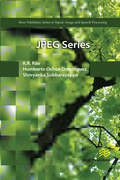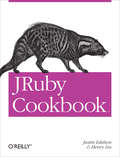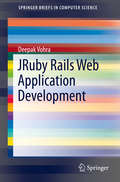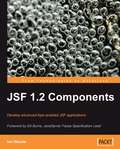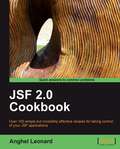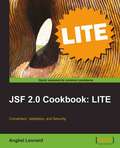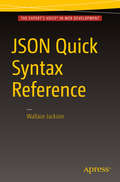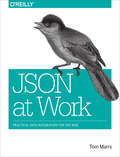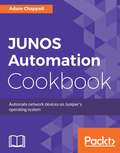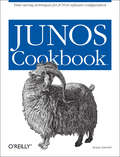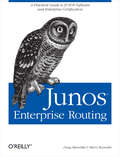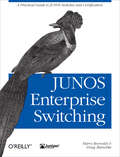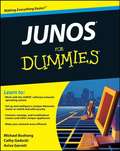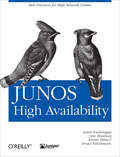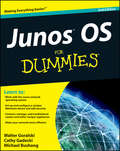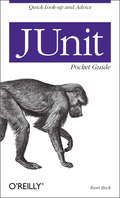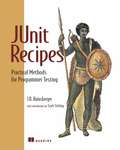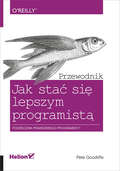- Table View
- List View
JMeter Cookbook
by Bayo ErinleThis book is great for you if you are a developer, quality assurance engineer, tester, or test manager who is looking to get a firmer grasp of elementary, deep, and advanced testing concepts using Apache JMeter. It's assumed you have access to a computer and an Internet connection. No prior testing or programming experience is required, but would be helpful.
JPEG Series
by K.R. Rao Humberto Ochoa DomínguezWhile the JPEG image standard was developed more than 25 years ago, it is still dominant in terms of image formation, manipulation and transmission over the internet and other media. As technology advances, new demands have arisen for the efficient transmission and storage of images causing other formats to emerge. Over the years, several extensions such as, JPEGLS, JPEG2K, JPEGXT, JPEGXR, JPEGXS and JPEG Pleno, have been added, constructing a series of standards for the compression and transmission of images. This book is the first to bring together most of the series of JPEG standards in a book.This book covers the descriptions of the JPEG standards and gives the reader an overview of the latest advances in the standards of the Joint Photographic Experts Group.Topics discussed include: • JEPG;• JPEG XR;• JPEG XT;• JPEG 2000;• JPEG XS;• JPEG Pleno;• JPEG AIC;• JPEG LS;• JPEG XL;• JPSearch;• JPEG Systems;• JBIG
JRuby Cookbook
by Justin Edelson Henry LiuIf you're interested in JRuby, you probably don't need a tutorial on Ruby, Rails, or Java -- you just need to know how to get things done. This Cookbook offers practical solutions for using the Java implementation of the Ruby language, with targeted recipes for deploying Rails web applications on Java servers, integrating JRuby code with Java technologies, developing JRuby desktop applications with Java toolkits, and more. Using numerous reusable code samples, JRuby Cookbook shows you how to:Install and update JRuby on Windows, Mac OS X, and Linux, and IDEs such as NetBeans and EclipsePackage and deploy Rails apps on Java Servlet containers and Java EE application servers, including JBoss, Tomcat, and GlassFishIntegrate Ruby and Rails applications with popular Java EE technologies such as JMS, JMX, JPA, Spring, and HibernateDevelop desktop and client applications with cross-platform Java UI technologies and toolkits such as Swing, SWT, and Java 2DMaximize the flexibility of your testing and build environment, using both existing Java-based tools such as Ant and Maven and newer Ruby-based tools such as Rake, Raven, and BuildrThe JRuby interpreter combines Ruby's simplicity and ease of use with Java's extensive libraries and technologies, a potent blend that opens new possibilities for Ruby, Rails, and Java. This Cookbook helps you take full advantage of JRuby's potential."The JRuby Cookbook is an excellent book for any polyglot who is trying to bridge the gap between Java and Ruby. It provides solutions to specific problems developers face in both their development and testing environments, along with the applications they're building."-- Bob McWhirter, Research & Prototyping, Red Hat Middleware
JRuby Rails Web Application Development
by Deepak VohraThis SpringerBrief explains how to create a Rails web application with JRuby, a 100% Java implementation for Ruby. This brief demonstrates how Oracle® WebLogic servers and JBoss® application servers deploy the JRuby application, how JRuby runs on the Java® Virtual Machine, and how JRuby is the basis for popular websites including LinkedIn, Oracle Mix, and Mingle. The Oracle® database and Oracle® MySQL database are used as the basis for the JRuby Rails application. Chapters also cover enabling Flash, developing the JRuby application using Ruby syntax, and deploying applications through Java EE WAR. Hands-on and practical, this SpringerBrief is designed for web developers and researchers interested in JRuby. It is also a useful guide for advanced-level students interested in creating a new web application.
JSF 1.2 Components
by Ian HlavatsThis book is a practical, hands-on guide to learning JavaServer Faces components based on a fictitious computer hardware e-commerce application. It adopts an example-driven approach focused on solving common web application development tasks using a wide range of JSF components from today's most popular JSF component libraries. Each chapter covers a different JSF component library and includes dozens of examples complete with Java source code listings, JSF markup, screenshots, and developer tips. If you are a professional web application developer interested in learning JavaServer Faces having an intermediate to advanced level of Java programming experience and a good understanding of HTML, CSS, and JavaScript, this book is for you. A working knowledge of Java classes, interfaces, annotations, and generics, Java Collections Framework, JavaBeans API, Java Database Connectivity (JDBC), Java Servlets/JSP, Java Authentication and Authorization Service (JAAS), Java Persistence API (JPA), Enterprise JavaBeans (EJB), the Apache Tomcat web container, the JBoss AS 4.2 application server is assumed. Experienced JSF professionals will also find this book useful as a quick reference and "how to" guide.
JSF 2.0 Cookbook
by Anghel LeonardThe JSF 2.0 Cookbook contains step-by-step instructions for JSF users to build desktop-style interfaces in their own web applications. The book is designed so that you can refer to it chapter by chapter, or you can look at the list of recipes and read them in no particular order. This book is for two types of audience: Newcomers who know the basics of JSF but are yet to develop real JSF applications., JSF developers who have previous experience but are lacking best practices and a standard way of implementing functionality
JSF 2.0 Cookbook: LITE
by Anghel LeonardPractical, hands-on "Cookbook" approach. Full of clear, step-by-step instructions that you can apply straight away. Written for people who want to get maximum results without lots of background and theory reading. JSF developers who want to work with validators, converters and security features of JSF. You don't need any prior knowledge of JSF to use these recipes.
JSON Quick Syntax Reference
by Wallace JacksonThis compact quick scripting syntax reference on JSON covers syntax and parameters central to JSON object definitions, using the NetBeans 8. 1 open source and Eclipse IDE software tool packages. JSON Quick Syntax Reference covers the syntax used in the JSON object definition language, logically organized by topical chapters, and getting more advanced as chapters progress, covering structures and file formats which are best for use with HTML5. Furthermore, this book includes the key factors regarding the data footprint optimization work process, the in-lining of . CSS and . JS files, and why a data footprint optimization work process is important. What you'll learn What is and how to use the Object Definition Syntax supported in JSON What comprises a JSON content production workflow What are the concepts and principles behind the JSON Object Definitions How to use JSON code snippets and apply them in your web applications How to utilize NetBeans, Android Studio and Eclipse IDEs for your JSON coding What are and how to use the key factors regarding the data footprint optimization work process, the in-lining of . CSS and . JS files And, why a data footprint optimization work process is important Who this book is for Primary: Website Developers, Android Application Developers, User Interface Designers, HTML5 OS Application Developers, HTML5 e-Learning Content Creators, HTML5 eBook Authors, HTML5 OS iTV Programmers, Android TV Programmers. Secondary: Blackberry Developers, Windows Developers, iOS Developers, Multimedia Producers, Rich Internet Application (RIA) Programmers, HTML5 Game Designers, Teachers, Educators.
JSON at Work: Practical Data Integration for the Web
by Tom MarrsJSON is becoming the backbone for meaningful data interchange over the internet. This format is now supported by an entire ecosystem of standards, tools, and technologies for building truly elegant, useful, and efficient applications. With this hands-on guide, author and architect Tom Marrs shows you how to build enterprise-class applications and services by leveraging JSON tooling and message/document design.JSON at Work provides application architects and developers with guidelines, best practices, and use cases, along with lots of real-world examples and code samples. You’ll start with a comprehensive JSON overview, explore the JSON ecosystem, and then dive into JSON’s use in the enterprise.Get acquainted with JSON basics and learn how to model JSON dataLearn how to use JSON with Node.js, Ruby on Rails, and JavaStructure JSON documents with JSON Schema to design and test APIsSearch the contents of JSON documents with JSON Search toolsConvert JSON documents to other data formats with JSON Transform toolsCompare JSON-based hypermedia formats, including HAL and jsonapiLeverage MongoDB to store and access JSON documentsUse Apache Kafka to exchange JSON-based messages between services
JUNOS Automation Cookbook
by Adam ChappellAdminister, configure, and monitor Junos in your organization About This Book • Get well acquainted with security and routing policies to identify the use of firewall filters. • Learn to provide end-user authentication and protect each layer in an enterprise network. • A recipe-based guide that will help you configure and monitor Junos OS and basic device operations. Who This Book Is For This book targets network engineers, developers, support personals, and administrators who are working on devices running Junos OS and are looking at automating their organisation's operations. Some understanding about Junos would be necessary What You Will Learn • Start using NETCONF RPC standard and understand its usefulness in programming JUNOS • Write SLAX scripts to respond to events in the JUNOS environment • Automate JUNOS with PyEZ • Deal with events in the JUNOS environment, and writing response handlers to deal with them • Make the most of automation technologies to help with maintenance and monitoring of JUNOS • Use the Ansible framework to extend the automation functionality of Junos In Detail The JUNOS Automation Cookbook is a companion guide for the complex field of automating tasks on JUNOS devices. With a foundation in industry-standrd XML, JUNOS provides an ideal environment for programmatic interation, allowing you to build upon the capabilities provided by Juniper, with your own original code. You will begin by learning about, and setting up, the industry-standard NETCONF remote procedure call mechanisms on your device. After initial setup, you'll walk through SLAX - Juniper's foundation scripting language - for manipulating XML representations of JUNOS concepts and elements. You'll learn how to write your own SLAX scripts to customise the operating environment, and also how to write proactive event handlers that deal with situations as they happen. You'll then delve into PyEZ - Juniper's bridging framework to make automation accessible to Python code - allowing you to build automation applications in the popular scripting language. You'll witness some examples of how to write applications that can monitor configuration changes, implement BGP security policies and implement ad-hoc routing protocols, for those really tricky situations. You'll also leaarn how asynchronous I/O frameworks like Node.js can be used to implement automation applications that present an acceptable web interface. Along with way, you'll explore how to make use of the latest RESTful APIs that JUNOS provides, how to visualize aspects of your JUNOS network, and how to integrate your automation capabilities with enterprise-wide orchestration systems like Ansible. By the end of the book, you'll be able to tackle JUNOS automation challenges with confidence and understanding, and without hassle. Style and Approach A guide that will cover all the automation tools along with steps on leveraging these tools
JUNOS Cookbook: Time-Saving Techniques for JUNOS Software Configuration
by Aviva GarrettThe Juniper Networks routing platforms are becoming the go-to solution for core, edge, metro and remote office networks, and JUNOS software is behind it all. The operating system is so full of industrial-strength routing protocols and IP innovations that those treading into the world of JUNOS will need clarification, explanation, and a showcase example or two. Look no further. This JUNOS Cookbook provides it all and more. Yes, you can mine through the 5,000 pages of documentation or take a two-thousand-dollar training course, but JUNOS's interprocess sophistication can be baffling unless you know the shortcuts and tricks, as well as those rays of illuminating comprehension that can come only from those who live with it. JUNOS Cookbook is the first comprehensive book about JUNOS software and it provides over 200 time-saving step-by-step techniques including discussions about the processes and alternative ways to perform the same task. It's been tested and tech-reviewed by field engineers who know how to take JUNOS out for a spin and it's applicable to the entire line of M-, T-, and J-series routers. JUNOS Cookbook will not only pay for itself the first few times you use it, it will make your network easier to manage and update. "Aviva Garrett has done a tremendous job of distilling the features of JUNOS software in a form that will be useful for a wide audience-students, field engineers, network architects, and other networking professionals alike will benefit from this book. For many people, this is the only book on JUNOS they will need."Pradeep Sindhu, CTO and Founder, Juniper Networks "This cookbook is superb. Aviva Garrett has masterfully assembled a complete set of practical real-world examples with step-by-step instructions. Security, management, routing: it's all here!"Stephen Gill, Research Fellow, Team Cymru "A technical time-saver for any NOC or SOC working with JUNOS. It's clear, concise, and informative recipes are are an invaluable resource. "Scott A. McIntyre, Security Officer, XS4ALL Internet B.V
JUNOS Enterprise Routing: A Practical Guide to JUNOS Software and Enterprise Certification
by Doug Marschke Harry ReynoldsWritten by the instructors and creators of the JNTCP-ER Certification Exams, JUNOS Enterprise Routing is the only comprehensive book for Juniper enterprise and edge routing environments. It offers complete coverage of all the services available to the JUNOS administrator, including JUNOS Enhanced Services (ES).This book is the official study guide for all three Juniper Enterprise Routing certification exams, and is highly recommended reading to pass the exams. With its field-guide emphasis on practical solutions, you can easily take the book beyond the classroom and into working networks as a design, maintenance, and troubleshooting reference par excellence.JUNOS Enterprise Routing covers all three certification exams in this track:Juniper Networks Certified Internet Associate (JNCIA-ER)Juniper Networks Certified Internet Specialist (JNCIS-ER)Juniper Networks Certified Internet Expert (JNCIE-ER)With more services such as voice, conference, and multicast on the IP router platform, the market for enterprise routers is growing exponentially, and the need for certified engineers to keep up with network developments in protocols and security is paramount. For everyone who works with Juniper enterprise and edge routing environments, this is a must-have book.
JUNOS Enterprise Switching: A Practical Guide to JUNOS Switches and Certification
by Doug Marschke Harry ReynoldsJUNOS Enterprise Switching is the only detailed technical book on Juniper Networks' new Ethernet-switching EX product platform. With this book, you'll learn all about the hardware and ASIC design prowess of the EX platform, as well as the JUNOS Software that powers it. Not only is this extremely practical book a useful, hands-on manual to the EX platform, it also makes an excellent study guide for certification exams in the JNTCP enterprise tracks. The authors have based JUNOS Enterprise Switching on their own Juniper training practices and programs, as well as the configuration, maintenance, and troubleshooting guidelines they created for their bestselling companion book, JUNOS Enterprise Routing. Using a mix of test cases, case studies, use cases, and tangential answers to real-world problems, this book covers:Enterprise switching and virtual LANs (VLANs)The Spanning tree protocol and why it's neededInter-VLAN routing, including route tables and preferencesRouting policy and firewall filtersSwitching security, such as DHCP snoopingTelephony integration, including VLAN voicePart of the Juniper Networks Technical Library, JUNOS Enterprise Switching provides all-inclusive coverage of the Juniper Networks EX product platform, including architecture and packet flow, management options, user interface options, and complete details on JUNOS switch deployment.
JUNOS For Dummies
by Aviva Garrett Michael Bushong Cathy GadeckiIf you're in charge of a network, you're probably aware that the only time anyone notices the network is when it goes down. With JUNOS software and JUNOS For Dummies, a friendly book to help you set it up and manage the software, you might be able to start convincing your clients to believe in magic. Here's the help you need for switching, routing, security, interface configuration, and more. Now, you can go inside JUNOS software and understand everything you need to know about operating a network with JUNOS. You'll learn how the control plane handles packet delivery and establishes traffic policies and see how a single network operating system can add stability and reliability while saving administrative time. Plus, you'll find out how to set up a routing protocol that automates configuration of routing tables for greater efficiency and how you can set up individual or group user accounts locally on the route, or on remote centralized authentication servers. By the time you finish this book, you'll know how to: Work with the JUNOS network operating system Set up and configure a Juniper router Connect, manage, and troubleshoot routers and other Juniper appliances Make your network more efficient Configure JUNOS default security features as well as restricted physical access to protect routers Solve hardware, software, interface, and router problems Integrate JUNOS with other systems Complete with lists of the most useful commands, IOS-JUNOS command conversions, and the best place to seek additional help, JUNOSFor Dummies is your one-stop guide to getting started with and mastering JUNOS.
JUNOS High Availability: Best Practices for High Network Uptime (Animal Guide)
by James Sonderegger Orin Blomberg Kieran Milne Senad PalislamovicWhether your network is a complex carrier or just a few machines supporting a small enterprise, JUNOS High Availability will help you build reliable and resilient networks that include Juniper Networks devices. With this book's valuable advice on software upgrades, scalability, remote network monitoring and management, high-availability protocols such as VRRP, and more, you'll have your network uptime at the five, six, or even seven nines -- or 99.99999% of the time.Rather than focus on "greenfield" designs, the authors explain how to intelligently modify multi-vendor networks. You'll learn to adapt new devices to existing protocols and platforms, and deploy continuous systems even when reporting scheduled downtime. JUNOS High Availability will help you save time and money. Manage network equipment with Best Common PracticesEnhance scalability by adjusting network designs and protocolsCombine the IGP and BGP networks of two merging companiesPerform network auditsIdentify JUNOScripting techniques to maintain high availabilitySecure network equipment against breaches, and contain DoS attacksAutomate network configuration through specific strategies and toolsThis book is a core part of the Juniper Networks Technical Library™.
JUNOS OS For Dummies
by Michael Bushong Walter J. Goralski Cathy GadeckiLearn to use JUNOS to make your network reliable!Providing network administrators with a reliable network operating system, JUNOS software is an award-winning network operating system that focuses on security and the avoidance of down time. This easy-to-understand book starts with the basics of JUNOS and walks you through its features so that you can quickly learn how to set up, operate, and add key services.Since the various JUNOS features are constantly being updated to provide your network with the best security possible, this new edition shares must-know information, helpful advice, handy tips, and essential cautions for working with JUNOS. Plus, you'll find out how to set up a routing protocol that automates configuration of routing tables for greater efficiency and how you can set up individual or group user accounts locally on the route, or on remote centralized authentication servers.Starts with the basics and introduces you to JUNOSExplains how to connect, manage, and troubleshoot routers and other Juniper appliancesOffers tips for making your network more efficient and reveals essential cautionsWalks you through setting up, operating, and adding key servicesDetails ways to configure JUNOS default security features as well as restricted physical access to protect routersBreaks down advanced concepts into easy-to-understand segments so you can build your knowledge graduallyThis new edition gets you started using the sophisticated features and techniques of JUNOS today.
JUnit Pocket Guide: Quick Look-up and Advice
by Kent BeckJUnit, created by Kent Beck and Erich Gamma, is an open source framework for test-driven development in any Java-based code. JUnit automates unit testing and reduces the effort required to frequently test code while developing it.While there are lots of bits of documentation all over the place, there isn't a go-to-manual that serves as a quick reference for JUnit. This Pocket Guide meets the need, bringing together all the bits of hard to remember information, syntax, and rules for working with JUnit, as well as delivering the insight and sage advice that can only come from a technology's creator. Any programmer who has written, or is writing, Java Code will find this book valuable. Specifically it will appeal to programmers and developers of any level that use JUnit to do their unit testing in test-driven development under agile methodologies such as Extreme Programming (XP) [another Beck creation].
JUnit Recipes: Practical Methods for Programmer Testing
by Scott Stirling J.B. RainsbergerWhen testing becomes a developer's habit good things tend to happen--good productivity, good code, and good job satisfaction. If you want some of that, there's no better way to start your testing habit, nor to continue feeding it, than with"" JUnit Recipes,"" In this book you will find one hundred and thirty-seven solutions to a range of problems, from simple to complex, selected for you by an experienced developer and master tester. Each recipe follows the same organization giving you the problem and its background before discussing your options in solving it. JUnit - the unit testing framework for Java - is simple to use, but some code can be tricky to test. When you're facing such code you will be glad to have this book. It is a how-to reference full of practical advice on all issues of testing, from how to name your test case classes to how to test complicated J2EE applications. Its valuable advice includes side matters that can have a big payoff, like how to organize your test data or how to manage expensive test resources. What's Inside: - Getting started with JUnit - Recipes for: servlets JSPs EJBs Database code much more- Difficult-to-test designs, and how to fix them - How testing saves time - Choose a JUnit extension: HTMLUnit XMLUnit ServletUnit EasyMock and more!
JUnit in Action
by Catalin TudoseJUnit in Action, Third Edition has been completely rewritten for this release. The book is full of examples that demonstrate JUnit's modern features, including its new architecture; nested, tagged, and dynamic tests; and dependency injection.Summary JUnit is the gold standard for unit testing Java applications. Filled with powerful new features designed to automate software testing, JUnit 5 boosts your productivity and helps avoid debugging nightmares. Whether you're just starting with JUnit or you want to ramp up on the new features, JUnit in Action, Third Edition has you covered. Extensively revised with new code and new chapters, JUnit in Action, Third Edition is an up-to-date guide to smooth software testing. Dozens of hands-on examples illustrate JUnit 5's innovations for dependency injection, nested testing, parameterized tests, and more. Throughout, you&’ll learn how to use JUnit 5 to automate your testing, for a process that consumes less resources, and gives you more time for developing. Purchase of the print book includes a free eBook in PDF, Kindle, and ePub formats from Manning Publications. About the technology The JUnit framework is the gold standard for unit testing Java applications—and knowing it is an essential skill for Java developers. The latest version, JUnit 5, is a total overhaul, now supporting modern Java features like Lambdas and Streams. About the book JUnit in Action, Third Edition has been completely rewritten for this release. The book is full of examples that demonstrate JUnit's modern features, including its new architecture; nested, tagged, and dynamic tests; and dependency injection. You'll benefit from author Catalin Tudose's unique "pyramid" testing strategy, which breaks the testing process into layers and sets you on the path to bug-free code creation. What's inside Migrating from JUnit 4 to 5 Effective test automation Test-driven development and behavior-driven development Using mocks for test isolation Connecting JUnit 5 with Maven or Gradle About the reader For intermediate Java developers. About the author Catalin Tudose has a Ph.D. in Computer Science, and over 15 years of experience as a Senior Java Developer and Technical Team Lead. Previous editions were authored by Petar Tahchiev, Felipe Leme, Gary Gregory, and Vincent Massol. Table of Contents PART 1 - JUNIT 1 JUnit jump-start 2 Exploring core JUnit 3 JUnit architecture 4 Migrating from JUnit 4 to JUnit 5 5 Software testing principles PART 2 - DIFFERENT TESTING STRATEGIES 6 Test quality 7 Coarse-grained testing with stubs 8 Testing with mock objects 9 In-container testing PART 3 - WORKING WITH JUNIT 5 AND OTHER TOOLS 10 Runing JUnit tests from Maven 3 11 Running JUnit tests from Gradle 6 12 JUnit 5 IDE support 13 Coninuous integration with JUnit 5 PART 4 - WORKING WITH MODERN FRAMEWORKS AND JUNIT 5 14 JUnit 5 extension model 15 Presentation-layer testing 16 Testing Spring applications 17 Testing Spring Boot applications 18 Testing a REST API 19 Testing database applications PART 5 - DEVELOPING APPLICATIONS WITH JUNIT 5 20 Test-driven development with JUnit 5 21 Behavior-driven development in JUnit 5 22 Implementing a test pyramid strategy with JUnit 5
JXTATM in a Nutshell
by Li Gong Scott Oaks Bernard TraversatO'Reilly's pioneering reference is the first and last word on this powerful distributed computing technology. JXTA in a Nutshell delivers all the information you need to get started, including an overview of P2P distributed computing, an explanation of the JXTA Project's new platform, and ways that developers can become a part of the development effort. JXTA in a Nutshell introduces major concepts in a hands-on way by explaining them in context to the shell, and contains a complete reference to the JXTA app
Jab, Jab, Jab, Right Hook: How to Tell Your Story in a Noisy Social World
by Gary VaynerchukNew York Times bestselling author and social media expert Gary Vaynerchuk shares hard-won advice on how to connect with customers and beat the competition. A mash-up of the best elements of Crush It! and The Thank You Economy with a fresh spin, Jab, Jab, Jab, Right Hook is a blueprint to social media marketing strategies that really works. When managers and marketers outline their social media strategies, they plan for the “right hook”—their next sale or campaign that’s going to knock out the competition. Even companies committed to jabbing—patiently engaging with customers to build the relationships crucial to successful social media campaigns—want to land the punch that will take down their opponent or their customer’s resistance in one blow. Right hooks convert traffic to sales and easily show results. Except when they don’t.Thanks to massive change and proliferation in social media platforms, the winning combination of jabs and right hooks is different now. Vaynerchuk shows that while communication is still key, context matters more than ever. It’s not just about developing high-quality content, but developing high-quality content perfectly adapted to specific social media platforms and mobile devices—content tailor-made for Facebook, Instagram, Pinterest, Twitter, and Tumblr.
Jack & Jack: You Don't Know Jacks
by Jack Gilinsky Jack JohnsonVine ingenues, YouTube megastars, hip-pop sensations, and best friends Jack & Jack bring their own brand of irreverent comedy, on-point style, and heartfelt life advice to You Don’t Know Jacks. Nebraska natives Jack Gilinsky and Jack Johnson shot to instant fame after their first Vine, “Nerd Vandals,” was dubbed “a perfect Vine” by the Huffington Post. It’s been looped more than ten million times since—and that Vine was just the beginning.Now, after a number one hit on iTunes, nearly two million singles sold, live performances where they have shared the stage with Demi Lovato, Shawn Mendes, and Fifth Harmony, and over 26 million followers across all their social media channels, Jack & Jack are on a wild ride—and they’re not planning to slow down anytime soon. Fans will love reading about their journey from being two regular kids growing up in Omaha, Nebraska, to global superstardom. Complete with never-before-seen photos, behind-the-scenes stories, and hilarious personal anecdotes, You Don’t Know Jacks is an insider look at the lives of Jack & Jack, as told by the guys themselves.
Jagged Alliance 2 (Boss Fight Books)
by Darius KazemiThe turn-based tactical role playing series Jagged Alliance has been sequeled, expanded, modded, optioned, multiplayered, and kickstarted, but the series' many fans usually point to Jagged Alliance 2 as the high water mark, and one of the finest turn-based video games of all time. Jagged Alliance 2 brings to the table a wicked sense of humor, simulation-driven character design, a combination of strategic overworld and tactical battles reminiscent of the X-COM series, and a surprisingly deep open-world RPG experience reminiscent of the Ultima or Elder Scrolls games. Focusing on JA2's development history and basing his book largely on new personal internviews with the game's developers, game designer and web technology developer Darius Kazemi delves deep into the legacy of a game that still has much to teach gamers and game-makers 14 years after its release.
Jailbreak Fire Stick TV Alexa Como desbloquear Guia de dicas passo a passo: Um guia passo a passo sobre como desbloquear dispositivos Amazon Fire Stick
by Hiddenstuff EntertainmentUm guia passo a passo sobre como desbloquear dispositivos Amazon Fire Stick Um guia passo a passo sobre como desbloquear dispositivos Amazon Fire Stick Se não, a melhor característica do Kindle Fire Stick é a capacidade de desbloqueá-los. Isso permitirá que você tenha acesso a qualquer conteúdo que desejar, como programas de TV, aplicativos, músicas e filmes. Aqui está o que você obterá: -Funciona para qualquer Fire Stick -Sobre o Jailbreak -Como fazer o Jailbreak -Resolver problemas -Aproveitar o acesso a aplicativos, filmes, músicas e programas de TV -> Role até o topo da página e clique em adicionar ao carrinho para comprar instantaneamente Isenção de responsabilidade: Este autor e / ou detentores de direitos não fazem reivindicações, promessas ou garantias sobre a precisão, integridade ou adequação do conteúdo deste livro e expressamente se isenta de responsabilidade por erros e omissões no conteúdo nele. Este produto é apenas para referência.
Jak sta? si? lepszym programist?. Przewodnik
by Pete GoodliffePodr?cznik prawdziwego programisty!Zawód programisty jak ?aden inny wymaga ci?g?ego rozwoju, nauki i doskonalenia. Ka?dy dzie? to nowe wyzwania, techniki programistyczne oraz kolejne linie wysokiej jako?ci kodu. Zastanawiasz si?, co jeszcze mo?esz zrobi?, aby sta? si? lepszym programist?? Chcesz zaimponowa? ciekawymi koncepcjami oraz wprowadzi? znacz?ce ulepszenia w codziennej pracy? Trafi?e? na ksi??k?, która sprawi, ?e Twój kod nabierze nowego blasku!Na kolejnych stronach tej ksi??ki przeczytasz o tym, jak powinien by? sformatowany kod ?ród?owy, jakie stosowa? nazewnictwo oraz jak usuwanie zb?dnego kodu wp?ywa na jego jako??. Nauczysz si? odnajdywa? b??dy w kodzie i pisa? dobre testy. Dowiesz si? tak?e, jak w pe?ni korzysta? z mo?liwo?ci systemu kontroli wersji. Ksi??ka ta jest obowi?zkow? lektur? dla ka?dego programisty ceni?cego sobie ci?g?y rozwój, d??enie do doskona?o?ci oraz tworzenie ?wietnego kodu! Techniki z poziomu kodu, dotycz?ce pisania wierszy kodu, testów, debugowania i radzenia sobie ze z?o?ono?ci?. Praktyki, podej?cia i postawy: zachowaj prostot?, wspó?pracuj z innymi, wykorzystuj gotowe rozwi?zania i twórz elastyczny kod. Strategie skutecznego uczenia si?, etycznego post?powania, szukania wyzwa? i unikania stagnacji. Praktyczne metody ko?czenia zada?: u?ywanie w?a?ciwych narz?dzi, ustalanie, jak ma wygl?da? gotowe rozwi?zanie, i szukanie pomocy ze strony wspó?pracowników. Nawyki dobrej wspó?pracy z innymi i traktowania programowania jak zaj?cia spo?ecznego.Obowi?zkowa lektura ka?dego programisty!

